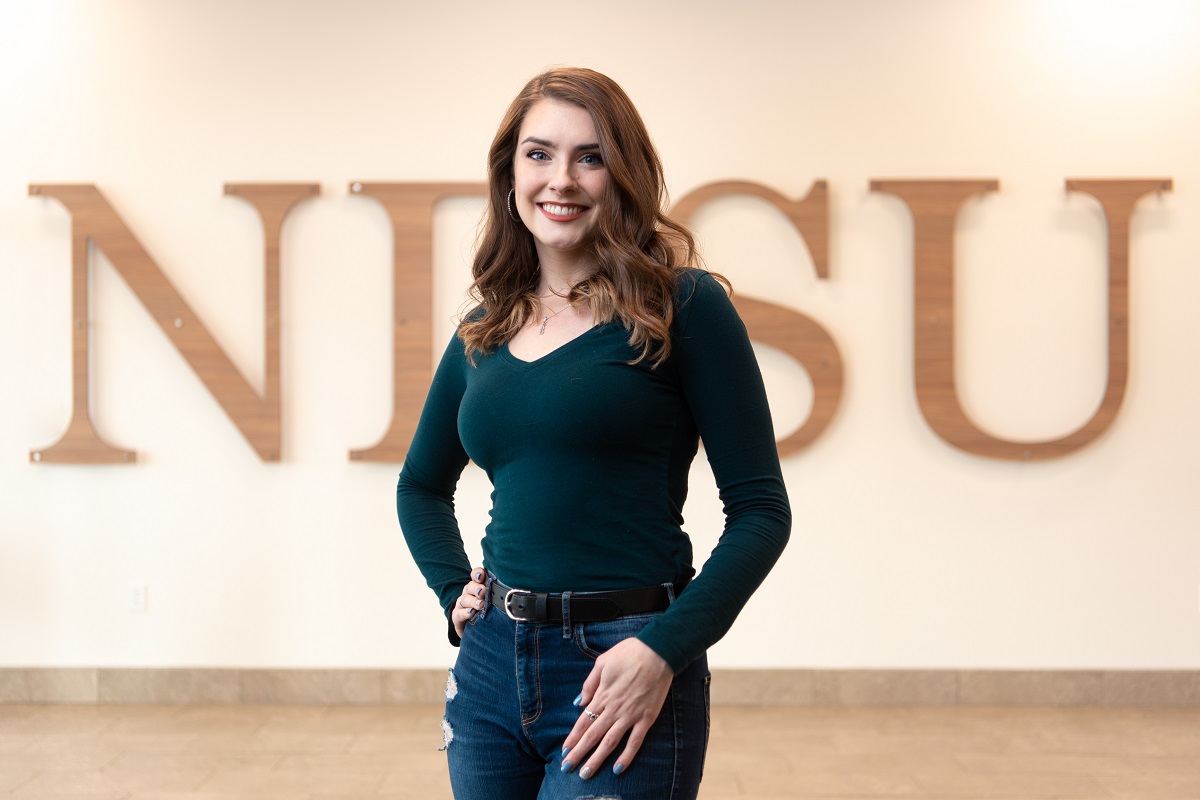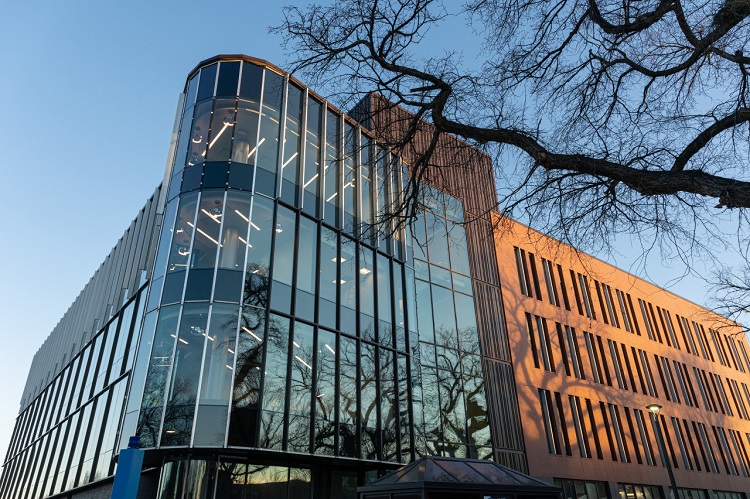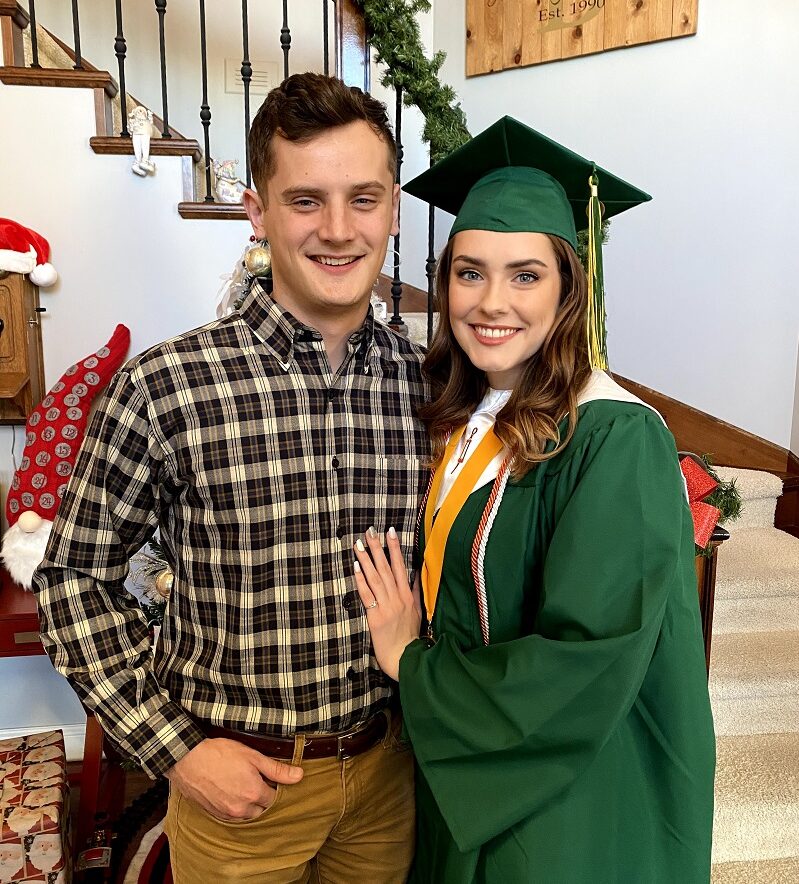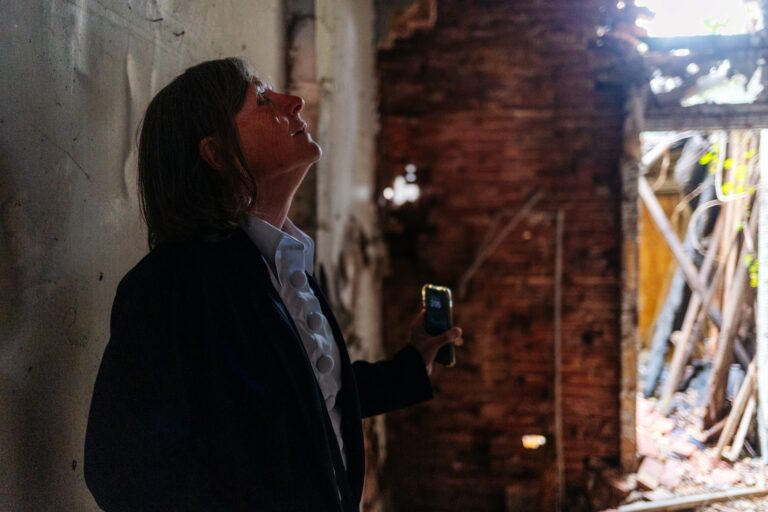Architect Kathleen Lechleiter ’81, ’82 is shaping safe, stable, and dignified housing in Baltimore neighborhoods.
Read MoreThe Glamour and Ingenuity of NDSU's First McGovern Scholar
Young girls lose interest in STEM subjects more frequently than their male peers. By embracing her passions, young alumna Darby Beyer '20 is rewriting the narrative.
Story by Micaela Gerhardt | April 11, 2022

Darby Beyer ’20, an industrial engineering and management graduate, describes her younger self as equal parts princess and repairwoman. She wore a tiara to first grade until her teacher told her she no longer could, and she was simultaneously her dad’s right-hand helper on all household projects, like fixing the vacuum and cleaning up the yard. For young Darby, enjoying dressing up as much as doing odd jobs wasn’t unconventional — it’s just who she was.
“I never really thought about it as being different. I’d just be all dressed up and working on stuff and that was fine. I still, to this day, love all things pretty and sparkly,” Darby said. “But engineering has always been more about the math for me.”
According to Martin W. Bauer, a professor at the London School of Economics, girls and women are much less likely than boys and men to express interest in science, technology, engineering, and math (STEM) subjects in middle and high school; study STEM in college; complete Ph.D.s in STEM fields; or remain in a STEM career. A lack of encouragement, mentorship, practical experience, and visible female role models were identified as the major factors that impact girls’ declining interest in STEM subjects — but Darby is an exception to this trend.
"I think it's really important to get girls interested in engineering and to make sure they know the career field is one of their options."
Darby Beyer
Growing up, math was consistently her favorite subject. She liked the puzzle aspect of it, trying to solve a problem, finishing it, and knowing she’d found the correct answer. Then, in high school, while attending a theatre rehearsal, Darby saw a flier for the robotics team and decided to check it out. She learned how to program code under the wing of an upperclassman and eventually stepped into the role of programming lead, which fueled her curiosity about the field of engineering.
While applying to colleges, Darby looked for schools with strong engineering programs and competitive scholarships, and that’s where the McGovern Scholarship came in.
In 2016, Harry D. McGovern ’66, a civil engineering graduate — and a nephew of A. Glenn Hill, a distinguished former professor of mathematics at NDSU — made what was, at the time, the largest single-gift-commitment in NDSU history to help recruit and retain students pursuing STEM degrees by establishing the Harry D. McGovern Scholarship.
As the first recipient of this prestigious, full-tuition award, Darby enrolled in the electrical engineering degree program at NDSU. A few months before her freshman year began, she received a handwritten letter from Lauren Singelmann, then president of NDSU’s Society of Women Engineers (SWE), inviting Darby to a pizza party during Welcome Week and letting her know that if she ever needed help with anything on campus, she could reach out.
A Place for STEM at NDSU

Constructed in 2015, the A. Glenn Hill Center is designed for hands-on learning and research in STEM. It’s named in honor of former NDSU professor A. Glenn Hill, who helped increase students, faculty, staff, and higher-level courses in the mathematics department over the course of his 39-year NDSU career.
SWE’s mission is to help empower and advance women engineers. At NDSU, the student-led organization prioritizes professional development and fosters leadership opportunities. They solicit professional engineers to speak at SWE’s monthly meetings, work on writing and building their resumes, and attend local and national conferences. SWE also initiates community outreach programs that help introduce young girls and boys to STEM activities and invite middle and high school girls to participate in fun, engineering-driven projects and events. Darby served as treasurer and then president of SWE during her time at NDSU.
“It’s interesting to see, over the age ranges, because the little girls are so into it, but when it gets up to the high school girls, they’re much less willing to talk to you, much less willing to show you what they did, and nobody’s like, ‘I want to show my project to the group,'” Darby said. “It’s kind of sad to see that, so SWE tries to promote girls being proud of their engineering work.”
In electrical engineering classes at NDSU, before she changed her major, Darby said she felt welcomed and supported, but she was oftentimes among only two or three other women in a class of 40-50 students. Although she never felt dismissed by her male peers, Darby certainly noticed the gender discrepancy.
“I think it’s really important to get girls interested in engineering and to make sure they know the career field is one of their options,” Darby said. “I don’t like the idea that we have to make girls go into things, but it’s important to make sure they know they’re doing a good job, and if they like it, they should be confident to continue doing it.”
A Place for STEM at NDSU

Built in 2021, Sugihara Hall is designed to maximize learning and research in chemistry and geosciences. It’s named in honor of former administrator, professor, and researcher Dr. James M. Sugihara, who made a lasting impact on the NDSU community and mentored people including Dr. Neil C. Gudmestad, a university distinguished professor at NDSU.
Darby’s own confidence, studiousness, and scholarship support took her far at NDSU. She became involved with Greek life, the Student Government finance committee, honor societies, and judged a few local and regional robotics competitions, all while being an active member of SWE.
“I know a lot of people who worked one or two jobs in college and never had enough time. I know girls who couldn’t join a sorority or couldn’t come to SWE events because it conflicted with their work schedule. It impacts a lot of your experience at NDSU if you aren’t able to participate in those groups,” Darby said. “Not all your engineering learning comes from the classroom — I learned great leadership skills and technical skills by studying with other people, doing different outreach projects, and participating in student organizations — you do learn more if you have the time.”
After graduating in a virtual setting in the spring of 2020, Darby accepted a job as a systems engineer with Honeywell Aerospace in Minneapolis, Minnesota, where she worked in commercial navigation and conducted project engineering to support current and up and coming aircraft technology, including urban air mobility (UAM) vehicles. In February 2022, she transitioned to a new career with Optum Health in Eden Prairie, Minnesota, where she currently works as an actuarial analyst.
When I spoke with Darby shortly after she learned she had gotten the job at Optum, she was absolutely ecstatic. I could hear her excitement as she told me that she had just ordered a textbook to prepare for her actuarial accreditation exams — the first time she had purchased one since graduating.
“I get to go back to studying!” Darby exclaimed. “I ordered the textbook last night, and I’m like, ‘Yes!'”
Darby, the woman who loves glitz and glam as much as she loves learning, is also absolutely delighted to be planning her upcoming wedding. Over Homecoming weekend in Fargo in 2021, she and her fiancée, Tim Straus ’19, a manufacturing engineering graduate, got engaged. She and Tim plan to continue returning to campus to tailgate and cheer on the Bison with their friends and families, who have also become big NDSU fans.

Share This Story
Related Stories
Structures of Connection
Joanna Slominski ’04 wants us to think differently about construction — it’s more than bricks and concrete.
Read More
